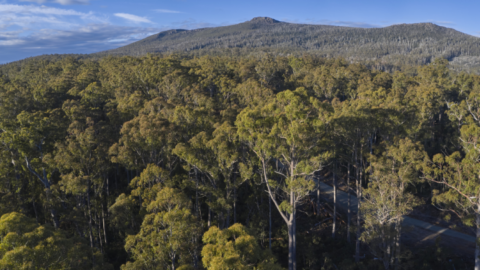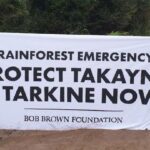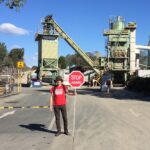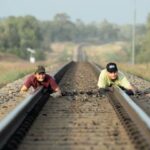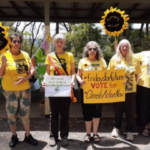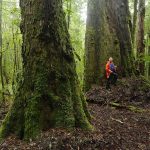Ending Native Forest Logging Is Within Reach: Bob Brown Foundation’s Jenny Weber on the National Campaign

Mid-July saw yet another Australian locked up over an environmental protest. This time it was 47-year-old veterinarian Dr Colette Harmsen, who was protesting mining in northwest Tasmania, which was in breach of a suspended sentence imposed upon her for an earlier antilogging demonstration.
Harmsen, who’s also a Bob Brown Foundation peaceful forest defender, was served up a three-month sentence. And prior to learning her fate, she told a crowd of supporters gathered outside the court that she’s been breaking the law because she’s “terrified of the worsening climate crisis”.
Legendary environmentalist Bob Brown said following the sentencing that Harmsen is like millions of others, “horrified by the deliberate killing” of what life humans have yet to see extinct. And he added that some scientists consider that 70 percent of life on Earth has been destroyed since 1970.
And in a similar vein to Harmsen, the Bob Brown Foundation is now organising nationwide rallies in August, ahead of the Labor National Conference later that month, to push for an end to the logging of native forests, which is a possibility the organisation considers “may finally be within reach”.
A national trend
As part of its May state budget, the Andrews government announced it was bringing the logging of native forests to an end this December, which is six years earlier than its previous goal, which surprised many, considering the zeal it had taken to logging following the Black Summer bushfires.
The Victorian reform followed a similar move announced by the McGowan government in 2021 that saw it commit to broadly ending native forest logging in WA, outlining that it would be investing enough in wood plantations, so that remaining old growth forests can be left alone.
And the message coming from the Bob Brown Foundation is clear, if Labor premiers in two states can bring an end to native forest logging, then Albanese ought to step up and implement a nationwide ban, especially at a time when the globe is fretting over rising temperatures.
The founder of the Australian Greens is not alone either, as just last month, fifteen crossbenchers wrote a letter to environment minister Tanya Plibersek calling on her to bring an end to native forest logging and to transition to relying on plantation trees specifically grown for such purposes.
Before it’s too late
Whilst burning of fossil fuels is leading to the heating of the planet, via the release of carbon dioxide into the atmosphere, which, right now, sees the month we’re currently living through the hottest time in human history, this is only being exacerbated by the removal of ancient forests.
So, whilst state governments have been scrambling to pass laws to threaten climate defenders with draconian penalties for nonviolent acts designed to draw attention to the collapsing environment, it appears that major party politicians may just be starting to see the forest for the trees.
Sydney Criminal Lawyers spoke to Bob Brown Foundation campaign manager Jenny Weber about how her organisation aims to put ending native forest logging on the agenda of this year’s Labor Party National Conference, as well as making it a priority issue for the 2025 federal election.
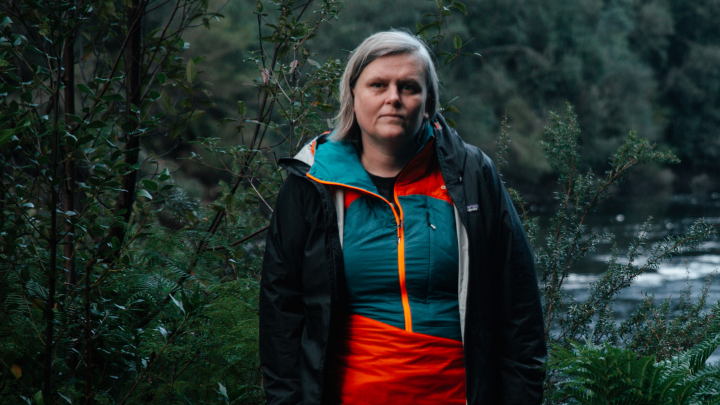
The Bob Brown Foundation is running the Rally for Native Forests Nationwide campaign in August.
So, Jenny, in the wake of the 2019-20 Black Summer bushfires, which followed decades upon decades of logging, what sort of state are Australian native forests in at present? And can you further put this in the context of the climate crisis?
Australia’s forests are still incredibly important, intact and vital for wildlife. But the Black Summer bushfires also showed that they’re critically important for the climate crisis.
We can go back to our days of science, when we learnt at school that we need forests to breathe, the animals need forests for habitat, and with the climate breaking down, trees are the natural solution.
That’s only the case if we also leave fossil fuels in the ground. We understand that there’s multi-climate actions that need to happen.
But an immediate solution to what we’re going to be facing with climate breakdown is that if we leave all of Australia’s forests intact and securely protected for their carbon values, they’re actually going to be an enormous contribution to mitigating the impacts that we’re about to see.
I’ve been reading the news, just like everyone else over the last couple of days, with all the heatwaves in Europe and the hottest days we’ve ever had, and it also becomes apparent for people to recognise that trees provide shade, and they cool us down.
There’s an incredible experience for us in the frontline action space, out there in the forests, as, if we’re spending time in a clearfell and it’s really hot, the moment we walk into a rainforest, we immediately cool down.
And it’s the same in the cities, when there are trees in the city and people are feeling the heat, they’re able to find shade under a tree or the movement of the wind through a tree, and these are of great benefit to humans for their survival.
The absolute importance is that if we are able to actually have forests left intact and restore forests that have already been degraded, that will give us an opportunity to mitigate the climate emergency.
Fifteen members of the crossbench last month wrote to the federal environment minister Tanya Plibersek calling on the Albanese government to halt native forest logging in NSW and Tasmania.
Labor’s Environment Action Network (LEAN) is also pushing the federal government to end native logging, with 192 branches endorsing the call, ahead of Labor’s national conference in August.
So, from the foundation’s estimates how is the federal government tracking in terms of its logging policies and what needs to change?
They don’t have a policy to end native forest logging. That’s what we’re calling for and we’re so thankful that there are people in parliament calling for the same.
That has been the case since Bob was in parliament: people have been saying, “Let’s protect native forests for their climate and wildlife benefits.”
The Labor government has still got a way to go. But prime minister Anthony Albanese is the key, as is his federal environment minister Plibersek, to knowing that we can actually stop the forest carnage.
The challenge is for them both to recognise that there are more than enough plantations to meet Australia’s wood needs.
We’re going to be the generation that puts a stop to the forest carnage, or we’re going to be the generation that continues to lose what is a natural climate solution in protecting the forests.
We’re in a mass extinction. It’s extraordinary how many species we know rely on forests for their survival. That’s with the swift parrot, koalas and the greater glider. But there is still the logging of forests.
So, whilst we have heard from minister Plibersek that they have a zero extinction policy, the policy needs to be enacted, because it just seems like greenwashing when koala habitat is being logged or critically endangered swift parrot habitat is being logged.
Both of those habitats in NSW and Tasmania are being lost to logging, when we don’t need to be logging native forest anymore. We have enough plantations.
So, the ALP has a way to go. That’s part of the intention with this campaign for nationwide rallies, to get people around the country to call for the protection of native forests.
We really want this to be a launching pad before the next federal election. We plan to do more of these and build up the campaign for native forest protections across Australia.
In May, the Andrews government announced, as part of the Victorian budget, that the state will halt the logging of native forests this December, which is six years earlier than previously planned.
What was the Bob Brown Foundation’s reaction to this development? And do you consider this outcome bodes well for the upcoming debate at the Labor national conference?
We welcomed premier Andrews’ announcement, as we did premier McGowan’s over in Western Australia. Here we have two ALP leaders who have made an announcement to end native forest logging in their states.
That is a very progressive move. We thought it was a historic day for Victoria. We sent congratulations to the forest activists, who, over the decades, had made that happen.
Fifty years of wood chipping has driven a massive assault on native forests nationwide, and premier Andrews made a big decision. He’s realised the dominos are falling, and it means that Tasmania, Queensland and NSW must be next.
What’s important though is what we have seen in Western Australia, as they’ve ended native forest logging, however there’s currently tens of thousands of hectares over there threatened by clearing for mining.
So, hence, that’s why we are going to the Commonwealth, to the prime minister, and saying, “We need our national forest to stay completely and securely protected from all clearing. We need them to remain intact.”
Climate and biodiversity are two sides of the same coin. So, protecting native forests can be a priority climate action. And look, it’s absolutely got to be promising for the ALP national conference to have a room with Victorians and Western Australians committed to ending native forest logging.
We still have a way to go though. And we’re going to be rallying outside that ALP national conference, and inviting citizens to join us, in saying to Anthony Albanese that this can be a moment that you can take to protect the forests, the climate and biodiversity.
In terms of taking climate action and transitioning away from fossil fuels, it’s well known that the industry and its links to both major parties hinder reform.
How does this sort of scenario translate when it comes to logging? Does that industry carry enough weight to hold government back on reform?
Absolutely, one of the biggest blocks to the revolution that we need in the native forest industry being transitioned, is that there are some unions pushing for it to continue.
We’ve known for years that Michael O’Connor with the CFMEU is a real protagonist. He’s keen to keep native forest logging alive.
So, he’s one of the blocks to us getting native forest protection, and he’s one of the key lobbyists for the industry keeping native forest logging going.
We know that there are powerful lobby groups in the logging industry. But I’m interested in putting the plantation industry operators on the agenda.
The native forest loggers are arguing for continued subsidies at a great rate. It’s one of the most subsidised industries, like the fossil fuel industry. And you consistently get subsidies when it is a loss-making industry.
The NSW, Victorian and Tasmanian governments have all been subsidising native forest logging, and we’re concerned there are groups and lobbyists just like the fossil fuel industry, who are very powerful.
Former ALP minister Joel Fitzgibbon is lobbying on behalf of the native forest logging industry. So, we’re not shy to the fact that we do have problems as we have governments that are lobbied on behalf of the destruction of nature.
Our tactic is to get together with the community. We know the polls all show that Australians want what is left of our native forests protected. And the only way for us to work as an NGO and as a community is to mobilise people en masse and show that this is a real issue that people are concerned about.
Dr Colette Harmsen, a 47-year-old veterinarian, was sent to prison earlier this month for continuing to peacefully protest the further destruction of Tasmania’s threatened native forests.
There was an attempt to prosecute Harmsen under the Rockliff government’s new antiprotest regime, which targets those obstructing workplaces, such as logging sites, with up to 12 months prison time applying, but that failed.
Such laws have now been passed in Victoria, also where they have a focus on logging, as well as in NSW and South Australia, where there is more of a crackdown on urban street demonstrations focused on climate.
What are your thoughts on Harmsen’s case, as well as the broader approach Australian governments are now taking to those trying to save the environment in the form of severe penalties?
The state governments that are shackled by donations from the fossil fuel industry, or have an inability to see that the way forward is protecting the environment and taking climate action, have seen that the easy way out is to penalise the environmental defenders.
But it should be natural to protect environmental defenders. We live in a day and age where those are the citizens that should have their rights protected.
What a shocking disgrace we have in Australia when these antiprotest laws are being rolled out with such venom.
The South Australian one especially showed this. There was no thought put into them by the SA government’s legislative process. It was in the morning, let’s speak about it on talkback radio and by lunchtime, let’s have draconian antiprotest laws before parliament.
If anything, that South Australian example has shown that in the morning, you can have a conversation about native forests being important to protect and by lunch time, you could have legislation that protects it.
It is just so out-of-date and frightful that the defenders are penalised: those who are consistently standing up – scientists, everyday citizens, people concerned about the future, young people and old people – and saying there’s a solution to all of this and it’s real climate action and protection.
Colette is the perfect example of a scientist, who has been inside the government, has been working for the Tasmanian Devil, and found she was just hitting her head up against a brick wall because the government would not take the actions that are necessary to protect endangered species.
So, she carried out a series of protests. Her protests are because she keeps seeing the problems out there in Tasmania’s wild environment from the mining of takayna to the logging of ancient forests.
To imprison someone over this is the wrong way. We are past that. However, what’s important to point out about as well, is that people like Colette are willing to go to gaol.
They’re willing to say, “Okay, you’re not listening here. I am prepared to go to gaol because the laws are designed to support the industries that are causing the ongoing destruction of nature, and I am here to resist that nonviolently.”
It is so important to recognise throughout Australia, everyone practises nonviolence in their direct actions, and here we have draconian antiprotest laws bringing in severe sanctions for people who are nonviolent.
It seems criminal to be sending someone like Colette to gaol. So, it’s time to change the rules.
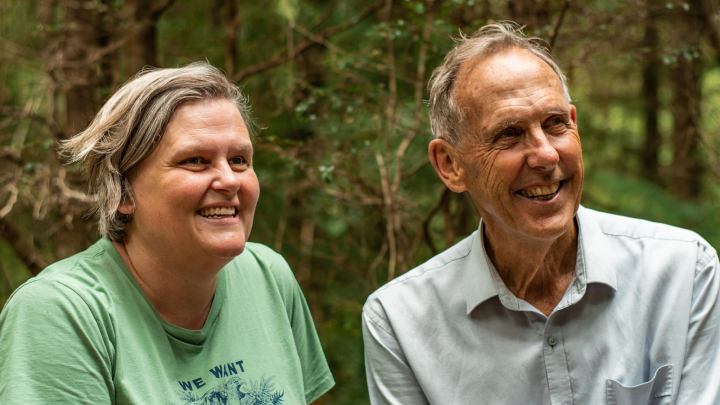
And lastly, Jenny, the rallies will take place commencing in Coffs Harbour on 11 August, seven separate protests will take place nationwide, including in Sydney, on 12 August, and then the final rally in Brisbane will take place on 19 August to coincide with the Labor national conference.
Why should people get involved? And what’s the impact the Bob Brown Foundation is expecting to have in taking these measures?
Our intention, the impact we foresee happening, is to start rallying people and mobilising action on forests across Australia to put pressure on Anthony Albanese to protect all of Australia’s native forests.
We understand that there’s a long way to go, but there shouldn’t be. We should just be seeing protection of forests happening, because people here at the foundation, like Bob Brown and Christine, have been asking for forest protection since the 80s.
What we will see is rallies in nine different places, which is a huge feat for our organisation. And already, we have hundreds of volunteers, working to pull these together.
We have Shane Howard from Goanna in Melbourne. We have a fantastic array of artists signing up to be involved. But also, there will be activists on those platforms talking about the forests specifically.
In Perth, we have Professor Fiona Stanley, as our MC. So, we have high-profile Australians lending their support to the rallies.
Then we have activists, who are right there right now witnessing the loss of habitat for koalas and the swift parrot. They’ll be on those platforms rising up with the rest of the country.
This is a launching pad for us to build on this campaign to do more things after these three days of nationwide actions, with our intention to have forests on the agenda for the election come 2025.
Now, on Thursday 10 August, we’re going to have frontline actions, and on the Friday, we have people meeting with their ALP members. These are constituents signing up to go and meet their federal ALP members to talk about forests.
So, it’s three days of concerted action on native forests.
Nationwide Bob Brown Foundation Native Forest rallies are taking place in August:
On Friday 11 August:
In Coffs Harbour, at 10 am at Brelsford Park
On Saturday 12 August:
In Sydney, at 1 pm at Addi Road Community Organisation in Marrickville
In Melbourne, at 11 am at Treasury Gardens in East Melbourne
In Hobart, at 11 am at Hobart City Hall
In South Coast NSW, at 11 am the Ulladulla Civic Centre
In Albury, at 11 am at QEII Square
In Lismore, at 12 pm at the Quad Lismore
In Perth, at 11 am outside WA Parliament House
On Saturday 19 August:
In Brisbane, at 9 am at Musgrave Park to coincide with the 2023 Labor National Conference
